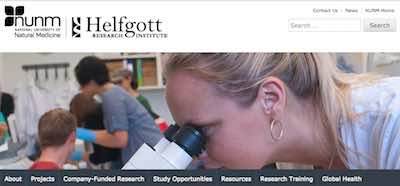 RESEARCH INITIATIVES for ALTERNATIVE MEDICINE
RESEARCH INITIATIVES for ALTERNATIVE MEDICINE
Facilities & Abstracts
Following is a directory of research-based organizations that are investigating the effects of nature-based and alternative medicine applications. Because Alternative Medicine is still in its “embryonic stage”, compared to Mainstream Medicine, funding is still sparse for these projects. By supporting Alternative Medicine, and expanding your healthcare choices, you are part of a grassroots movement that is tipping the scales toward more governmental and corporate support of the Alternative sector.
NUNM’s Helfgott Research Institute
Helfgott Research Institute is a professionally independent, non-profit research institute whose mission is to conduct rigorous, high quality, research on the art and science of healing, specifically working to understand natural forms of medicine. Together, scientists from the fields of naturopathic medicine, Chinese medicine, acupuncture, immunology, and nutrition apply their expertise to the study of natural medicine.
Established in June of 2003 with the help of a donation from Don Helfgott, NUNM’s Helfgott Research Institute (Helfgott) has a state-of-the-art basic science laboratory, as well as the resources to carry out clinical research.
Current faculty research projects at Helfgott include grants directly funded by the National Institutes of Health’s National Center for Complementary and Alternative Medicine. In addition, Helfgott participates in several collaborative grants with Oregon Health & Sciences University (OHSU) as well as with other Western biomedical and naturopathic schools.
The BMJ: Abstract on Attitudes Toward Complimentary Medicine
The attitudes to complementary medicine of a random sample of general practitioners in Avon were assessed. A questionnaire was sent to 200 general practitioners, of whom 145 responded. The treatments studied were acupuncture, homeopathy, herbal medicine, spinal manipulation, faith healing, and hypnosis.
Of the 145 general practitioners,
- 55 (38%) had received some training in complementary medicine and
- 22 (15%) wished to arrange training. Overall, general practitioners knew little about the techniques of complementary medicine.
- Despite this 86 doctors (59%) thought that the complementary techniques being assessed were useful to their patients:
- 110 (76%) had referred patients for this type of treatment over the past year to medically qualified colleagues and
- 104 (72%) had referred patients to non-medically qualified practitioners.
Read the ENTIRE ABSTRACT at BMJ’s website.
KARGER Medical & Scientific Publishers:
Abstract Points to Effectiveness of Homeopathy
This abstract describes the faults and frailties of the systems of research that have previously “tested” the effectiveness of Homeopathy against placebos. They quote a 1997 study involving 89 clinical trials, whose overall results showed a 2.45 to 1 ratio in favor of homeopathy.
The article goes on to explain the weaknesses of the “flawed statistical methods used to prove that homeopathy lacks clinical effect.
Read the ENTIRE ABSTRACT at Karger.com
RCCM: Research Council for Complimentary Medicine (UK)
The RCCM advances public education through the promotion of research into complementary medicine. The RCCM aims to:
- facilitate research into Complementary and Alternative Medicine through advocacy to research funders
- explore the relationship between CAM and conventional medicine e.g. through events involving NICE, the Advertising Standards Authority and the NHS
- disseminate research findings via its allied journal, EUJIM
We offer:
- a free news service, via CAMRN, to over 900 researchers and interested parties
- research conferences, including CAMSTRAND, the annual leading conference in research into CAM
- member benefits, such as access to grants and awards
- specific events for corporate members on key areas such as as the NHS and research strategy development
- support and advice for student members


